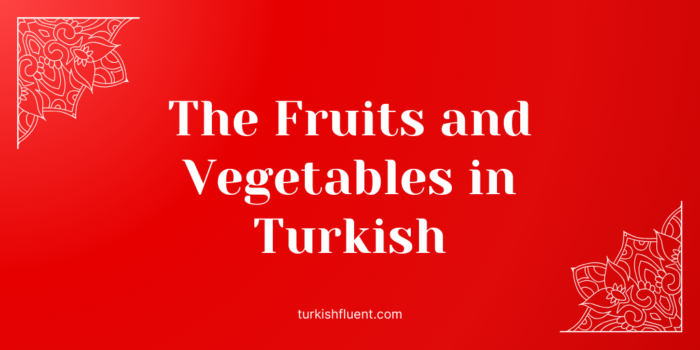Learning the names of fruits and vegetables in Turkish is a fundamental step for building your vocabulary, especially if you live in Turkey, love cooking or frequently visit markets. This guide will provide you with lists of common fruits and vegetables, followed by some idiomatic expressions (deyim) that are related to fruits & vegetables and are commonly used by locals. Feel free to add the missing fruits and vegetables in comments.
Table of Contents
The Fruits in Turkish
Meyve means “fruit” in Turkish. Here is a list of the most common fruits in Turkish:
| Turkish | English |
|---|---|
| Ahududu | Raspberry |
| Elma | Apple |
| Altıntop | Grapefruit |
| Ananas | Pineapple |
| Armut | Pear |
| Avokado | Avocado |
| Ayva | Quince |
| Böğürtlen | Blackberry |
| Çilek | Strawberry |
| Çir | Dried Apricot |
| Durian | Durian |
| Dut | Mulberry |
| Erik | Plum |
| Frambuaz | Raspberry |
| Greyfurt | Grapefruit |
| Hindistan cevizi | Coconut |
| Hurma | Date |
| Hünnap | Jujube |
| İncir | Fig |
| Kavun | Melon |
| Karpuz | Watermelon |
| Kayısı, Zerdali | Apricot |
| Kiraz | Cherry |
| Kivi | Kiwi |
| Kuşburnu | Rosehip |
| Limon | Lemon |
| Mandalina | Mandarin Orange |
| Mango | Mango |
| Muz | Banana |
| Nar | Pomegranate |
| Papaya | Papaya |
| Portakal | Orange |
| Üzüm | Grape |
| Vişne | Sour Cherry |
| Yaban mersini | Blueberry |
| Yemiş | Fig |
| Zeytin | Olive |
Examples:
- Her sabah kahvaltıda bir elma ve birkaç çilek yiyorum. (I eat an apple and a few strawberries every morning for breakfast.)
- Marketin önünde taze karpuz ve portakal satılıyor. (Fresh watermelon and oranges are being sold in front of the market.)
- Nar, Türk mutfağında salatalarda için sıkça kullanılır. (Pomegranate is often used in Turkish cuisine for salads.)
The Vegetables in Turkish
Sebze means “vegetable” in Turkish. Here is a list of vegetables:
| Turkish | English |
|---|---|
| Bamya | Okra |
| Basal | Onion |
| Bezelye | Pea |
| Biber | Pepper (Bell/Chili) |
| Brokoli | Broccoli |
| Domates | Tomato |
| Enginar | Artichoke |
| Fasulye | Bean (Green Beans) |
| Gölevez | Taro |
| Havuç | Carrot |
| Ispanak | Spinach |
| Işgın | Rhubarb |
| İştir | Wild Sorrel |
| Kabak | Zucchini (Courgette) |
| Karnabahar | Cauliflower |
| Kereviz | Celery |
| Kumpir | Baked Potato |
| Lazut | Sweet Corn |
| Marul | Lettuce |
| Nohut | Chickpea |
| Patates | Potato |
| Patlıcan | Eggplant (Aubergine) |
| Salatalık | Cucumber |
| Sarımsak | Garlic |
| Lahana | Cabbage |
| Balkabağı | Pumpkin |
| Turp | Radish |
Examples:
- Akşam yemeği için çorba yaparken havuç ve patates kullandım. (I used carrots and potatoes while making soup for dinner.)
- Pazardan taze ıspanak ve marul aldık. (We bought fresh spinach and lettuce from the market.)
- Karnabahar, fırında pişirilince çok lezzetli oluyor. (Cauliflower tastes very delicious when baked in the oven.)
Idioms With Fruits or Vegetables in Turkish
Turkish has many idiomatic expressions involving fruits and vegetables, reflecting their cultural significance along with the Turkish cuisine. Here are three common idioms and their meanings:
- Üzüm üzüme baka baka kararır.
- Translation: Grapes darken by looking at each other.
- Meaning: People influence each other by spending time together.
- Example: “Arkadaşlarını seçerken dikkat et, üzüm üzüme baka baka kararır.
- Armut piş, ağzıma düş.
- Translation: Let the pear ripen and fall into my mouth.
- Meaning: Said about someone who expects things to happen without any effort.
- Example: “Hiç çalışmıyorsun, armut piş, ağzıma düş mü diyorsun?” (You’re not working at all; are you expecting everything to come to you effortlessly?)
- Üzümünü ye, bağını sorma.
- Translation: Eat the grape, don’t ask about the vineyard.
- Meaning: Enjoy something without questioning where it came from or how it was made.
- Example: “Bu kadar sorgulama, üzümünü ye, bağını sorma.” (Don’t overthink it; just enjoy the result.)
